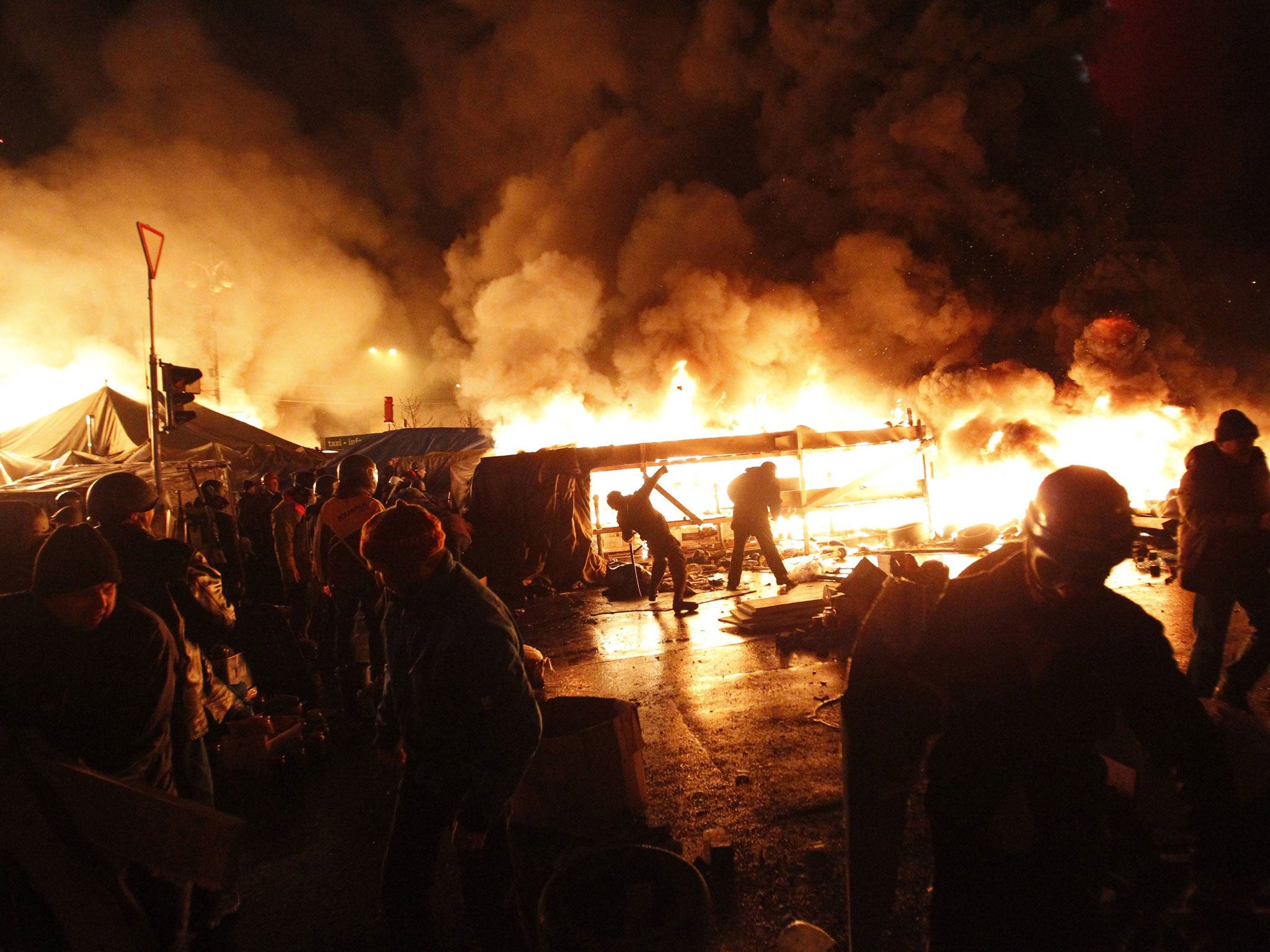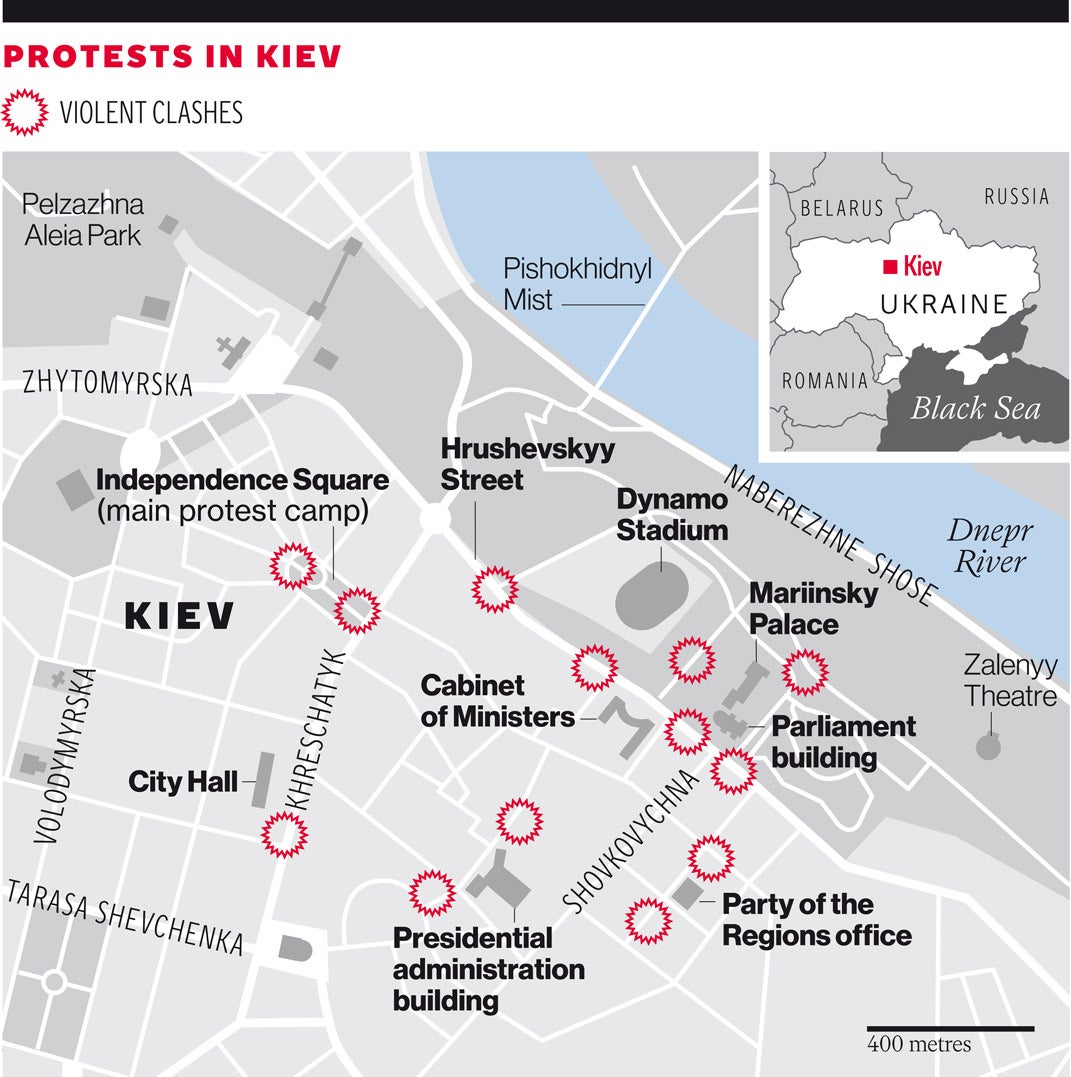Ukraine unrest: Police and civilians die as officers 'fire water cannon on protesters throwing petrol bombs'
Amid international condemnation, the opposition vows not to be cowed by the latest violence as its leaders meet President Viktor Yanukovych

Your support helps us to tell the story
From reproductive rights to climate change to Big Tech, The Independent is on the ground when the story is developing. Whether it's investigating the financials of Elon Musk's pro-Trump PAC or producing our latest documentary, 'The A Word', which shines a light on the American women fighting for reproductive rights, we know how important it is to parse out the facts from the messaging.
At such a critical moment in US history, we need reporters on the ground. Your donation allows us to keep sending journalists to speak to both sides of the story.
The Independent is trusted by Americans across the entire political spectrum. And unlike many other quality news outlets, we choose not to lock Americans out of our reporting and analysis with paywalls. We believe quality journalism should be available to everyone, paid for by those who can afford it.
Your support makes all the difference.Ukraine has seen its deadliest day of violence since anti-government protests began, with fierce clashes bringing new intensity to a political crisis that has festered in Kiev since late November.
At least 11 demonstrators and seven police officers were killed in street battles in the Ukrainian capital, with hundreds more injured and several of the dead suffering gunshot wounds.
The violence continued through the night as the security forces tried to force their way into the protest camp in Kiev's Independence Square and surrounding buildings.
The city's trade union building, which had been used as an opposition base, was set on fire and snipers were reported to be deliberately targeting protest leaders who took to a stage to rally supporters. Opposition leader Aleksandr Turchinov was among those said to have been shot as he stood on the stage, but it was unclear how seriously he was hurt.
As the violence intensified US Vice President Joe Biden telephoned Ukraine's President Viktor Yanukovych to urge him to withdraw the government forces from Independence Square and to exercise restraint. He also emphasised the protesters had “legitimate grievances”.
“The vice president further underscored the urgency of immediate dialogue with opposition leaders to address protesters' legitimate grievances and to put forward serious proposals for political reform,” a White House spokesman said.
Two opposition leaders - Vitali Klitschko, the world champion boxer-turned-politician, and Arseniy Yatsenyuk, leader of Ukraine's largest opposition bloc - arrived late last night at President Yanukovych's office for talks.
Clashes had earlier erupted outside government buildings in the centre of the city after opposition leaders warned that security forces were planning to clear the sprawling protest camp in Independence Square, which is also known as the Maidan. Television footage showed anti-government protesters throwing petrol bombs, fireworks and rocks at riot police, and setting fire to piles of tyres to prevent officers from entering the Maidan, while hundreds of riot police used water cannons on advancing protesters in sub-zero temperatures.

Before heading to the President's office for talks, Klitschko, who heads the opposition party Udar (Punch), called on Yanukovych to resign and to call early elections. In an address to the 20,000 protesters estimated to be in Independence Square he vowed: “We will not go anywhere from here, This is an island of freedom and we will defend it.”
Yatsenyuk was similarly defiant: “We see that this regime again has begun shooting people; they want to sink Ukraine in blood. We will not give in to a single provocation. We will not take one step back from this square. We have nowhere to retreat to. Ukraine is behind us, Ukraine's future is behind us.”

Despite the freezing conditions, dozens of tents have been set up in the square since the protests began in November, after Yanukovych spurned a historic trade and political agreement with European Union in favour of a £9bn financial bailout from Russia, used to balance the country's precarious finances. Russia had since frozen tranches of the aid amid behind-the-scenes pressure for Yanukovych to crush the protest movement.
Hundreds of thousands of people took the streets to demonstrate peacefully against the move, but the protests turned violent when the government introduced sweeping new legislation limiting basic freedoms in a bid to crush the opposition. Though it was later repealed, the opposition continues to push for early elections (due in 2015) and changes to the constitution.
The clashes came after Russia's Finance Minister offered to deliver another tranche of bailout funds on Monday, sparking fears that the move could pave the way for a Moscow loyalist as the new prime minister.
Join our commenting forum
Join thought-provoking conversations, follow other Independent readers and see their replies
Comments